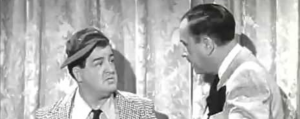
A number of weeks ago, I wrote about Ishmael. Actually, I wrote about his mother, and the piece was not so kind to her. I received scores of e-mail, some praising the piece, others railing that it was not strong enough, and still others decrying it, saying that it bordered on racism.
Today, once again, I am going to write about Ishmael. But before you gird your loins, let me tell you that I won’t speak about the biblical Ishmael, but rather his namesake, Rabbi Ishmael.
You see, one of the great sages of the Talmud was named Rabbi Ishmael. A fact that should shock our genteel readers. In fact, the Talmud is filled with quotes from Rabbi Ishmael. But how did he get such a name? After all, why would anyone name their child after the “wild-ass of a man whose hand is against everyone, and everyone’s hand is against him” (Genesis 16:11)? Rabbi Yishmael’s opinions are from the most significant in the entire Talmud yet his name is surely not a Rabbinic one? Or perhaps there is more to Ishmael than we truly know.
The answer is somewhat simple. It is base on two words in the Torah. “Yitzchak and Yishmael.” Let me put them in context. You see, the Torah tells us “Abraham expired and died at a good old age, mature and content, and he was gathered to his people. His sons Isaac and Ishmael buried him in the cave of Machpelah. (Genesis 25:8-9).” It seems innocuous enough. But alas, the Talmud infers something from two words that turn Ishmael, from the castigated wild-man, to one who is worthy of place in Jewish history, a Talmudic giant bearing his name.
The Talmud in Bava Basra tells us, that from the fact that Ishmael , the older son, yielded the precedence to Isaac, the more holy son, we gather that Ishmael repented of his evil ways and, in fact this is what is meant by the “good old age” mentioned in connection with Abraham’s passing.
Amazing! An entire life’s transformed is embodied in the smallest act of letting a younger brother go first. And Ishmael becomes the hero after whom the great rabbi is named! How is that? Just because he let his younger brother go first? Is that really possible?
Richard Busby (1606-1695), headmaster of the prestigious Westminster School was a strict disciplinarian. It is reputed that in his 58 years as headmaster only one pupil passed through the school without being personally beaten by Busby. With its fine reputation, the school was visited by King Charles II.
As Dr. Busby was showing King Charles II around the school, it was noticed that, contrary to etiquette, the headmaster kept his hat on in the royal presence. One of the kings aides, mention this flagrant violation of protocol to the headmaster.
Bushy demurred. He excused himself in these words: “It would not do for my boys to suppose that there existed a greater man on earth than I.”
Think about it. Who was at that funeral? All of Ishmael’s grandchildren, each strongly entrenched in the belief that they were the descendants of the truly chosen son.
And now comes Avraham’s funeral, an occasion attended by hundreds of his followers and admirers. Protocol would have the true heir walk first. It’s the perfect setting to make a statement. It is the setting where you can insist that you are the true heir and tell the world, that now, with the passing of Avraham, “there is no greater man on earth than I.”
Yet Ishmael defers. He lets Isaac go first. It is perhaps a greater act than laying down a sword or embracing an enemy. It is breaking an ingrained character trait. And breaking a character trait, breaking the desire for a little bit of respect in the eyes of observers is a true sign of greatness.
Thank you Rabbi Yishmael’s mom for letting us know that. Thank you Yishmael for being so brave. Pass the message on.
Copyright © 2001 by Rabbi M. Kamenetzky and Project Genesis, Inc.
If you enjoy the weekly Drasha, now you can receive the best of Drasha in book form! Purchase Parsha Parables at a very special price!
The author is the Dean of the Yeshiva of South Shore.
Drasha is the e-mail edition of FaxHomily, a weekly torah facsimile on the weekly portion which is sponsored by The Henry and Myrtle Hirsch Foundation


